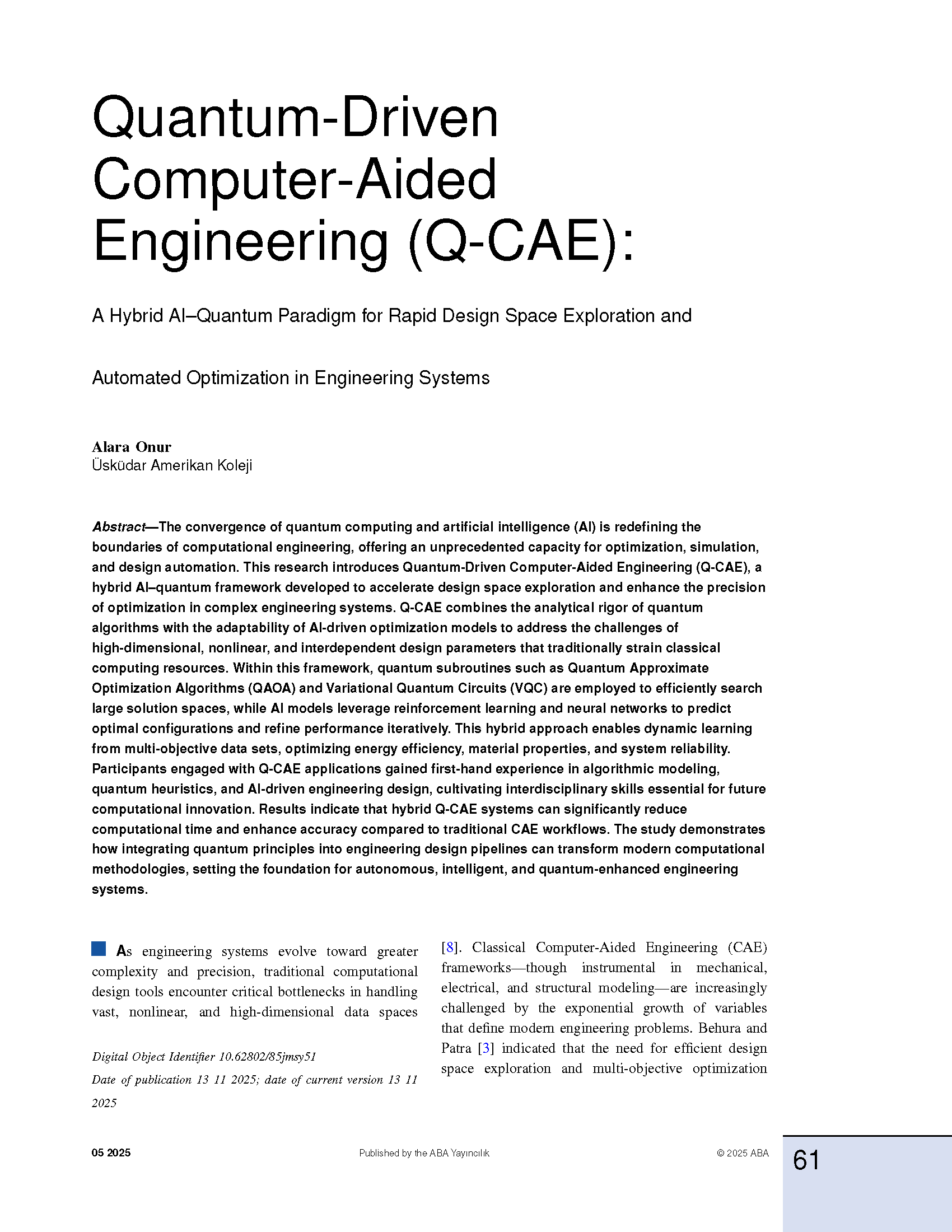Quantum-Driven Computer-Aided Engineering (Q-CAE): A Hybrid AI–Quantum Paradigm for Rapid Design Space Exploration and Automated Optimization in Engineering Systems
DOI:
https://doi.org/10.62802/85jmsy51Keywords:
Quantum-Driven Computer-Aided Engineering (Q-CAE), hybrid AI–quantum systems, design space exploration, automated optimization, engineering simulation, quantum heuristics, computational designAbstract
The convergence of quantum computing and artificial intelligence (AI) is redefining the boundaries of computational engineering, offering an unprecedented capacity for optimization, simulation, and design automation. This research introduces Quantum-Driven Computer-Aided Engineering (Q-CAE), a hybrid AI–quantum framework developed to accelerate design space exploration and enhance the precision of optimization in complex engineering systems. Q-CAE combines the analytical rigor of quantum algorithms with the adaptability of AI-driven optimization models to address the challenges of high-dimensional, nonlinear, and interdependent design parameters that traditionally strain classical computing resources. Within this framework, quantum subroutines such as Quantum Approximate Optimization Algorithms (QAOA) and Variational Quantum Circuits (VQC) are employed to efficiently search large solution spaces, while AI models leverage reinforcement learning and neural networks to predict optimal configurations and refine performance iteratively. This hybrid approach enables dynamic learning from multi-objective data sets, optimizing energy efficiency, material properties, and system reliability. Participants engaged with Q-CAE applications gained first-hand experience in algorithmic modeling, quantum heuristics, and AI-driven engineering design, cultivating interdisciplinary skills essential for future computational innovation. Results indicate that hybrid Q-CAE systems can significantly reduce computational time and enhance accuracy compared to traditional CAE workflows. The study demonstrates how integrating quantum principles into engineering design pipelines can transform modern computational methodologies, setting the foundation for autonomous, intelligent, and quantum-enhanced engineering systems.
References
Acampora, G., Ambainis, A., Ares, N., Banchi, L., Bhardwaj, P., Binosi, D., ... & Wilhelm, F. K. (2025). Quantum computing and artificial intelligence: status and perspectives. arXiv preprint arXiv:2505.23860.
Ao, Y., Li, S., & Duan, H. (2025). Artificial intelligence-aided design (AIAD) for structures and engineering: a state-of-the-art review and future perspectives. Archives of Computational Methods in Engineering, 1-28.
Behura, A., & Patra, R. (2025). Challenges and future prospects of integrating quantum computing into intelligent transportation systems: Exploring quantum innovations in transportation. Integration of AI, Quantum Computing, and Semiconductor Technology, 183-208.
Dai, F., Hossain, M. A., & Wang, Y. (2025). State of the art in parallel and distributed systems: Emerging trends and challenges. Electronics, 14(4), 677.
Marengo, A., & Santamato, V. (2025). Quantum algorithms and complexity in healthcare applications: a systematic review with machine learning-optimized analysis. Frontiers in Computer Science, 7, 1584114.
Mengesha, G. (2025). Revolutionizing Bridge Engineering: A Comprehensive Review of Smart Materials, AI-Driven Structural Optimization, and Resilient Design Innovations. AI-Driven Structural Optimization, and Resilient Design Innovations (May 14, 2025).
Murillo, J. M., Garcia-Alonso, J., Moguel, E., Barzen, J., Leymann, F., Ali, S., ... & Wimmer, M. (2025). Quantum software engineering: Roadmap and challenges ahead. ACM Transactions on Software Engineering and Methodology, 34(5), 1-48.
Serani, A., & Diez, M. (2025). A survey on design-space dimensionality reduction methods for shape optimization. Archives of Computational Methods in Engineering, 1-28.
Strielkowski, W., Grebennikova, V., Lisovskiy, A., Rakhimova, G., & Vasileva, T. (2025). AI‐driven adaptive learning for sustainable educational transformation. Sustainable Development, 33(2), 1921-1947.
Subramaniam, R. C., Morphew, J. W., Rebello, C. M., & Rebello, N. S. (2025). Presenting STEM ways of a thinking framework for engineering design-based physics problems. Physical Review Physics Education Research, 21(1), 010122.


